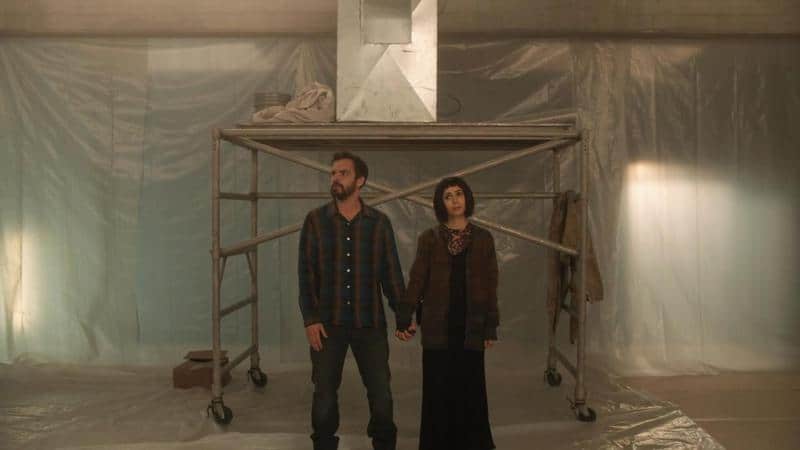[ad_1]
The tech comedy’s best episode is a decades-spanning story about selling out, breaking up, and making art.

Apple TV+
This essay is part of Episodes, a monthly column in which senior contributor Valerie Ettenhofer digs into the singular chapters of television that make the medium great. This entry revisits “A Dark Quiet Death,” the tremendous standalone episode of Mythic Quest’s first season.
Most of us don’t wake up every morning feeling sad about the death of pop culture as we once knew it. It’s perfectly possible to wander semi-peacefully through our days without lamenting the existence of every sell-out or spin-off. In part, it’s easy to ignore a change that happens slowly–the steady erosion of something extraordinary that most days feels as ineffectual as waves lapping against a cliff wall. It’s easy in the same way that ignoring the signs of a failing relationship is all too easy. Then something like Mythic Quest’s “A Dark, Quiet Death” comes along, and its force suddenly washes away our once-solid ground completely.
The fifth episode of Mythic Quest, directed by series co-creator Rob McElhenney and written by his sister Katie, is standalone in the truest sense. Aside from two small but meaningful details, its only ties to the overarching series are thematic. Up until this point, the Apple TV+ comedy about a dysfunctional video game company and the flawed creatives who run it is funny but slight. Not “A Dark Quiet Death,” though. In one of the most sneakily emotional sitcom detours in recent memory, the episode takes viewers through the exhilarating and painful life cycle of both a video game and a relationship. After this, the show never feels slight again.
“A Dark Quiet Death” starts in a video game store in 1993. Joy Division’s “Love Will Tear Us Apart” plays over the sound system as an inattentive store clerk blows the dust out of a game cartridge. In an empty aisle, two people meet for the first time. She (Cristin Milioti) is looking for a game bleak enough to match her choppy-haired goth girl aesthetic. He (Jake Johnson) is affably flirting, trying to sell her on a crappy game called Midnight Justice Five: Corpse Pile. They’re cute because two overtly lovable actors play them and because his plaid-shirted shrugginess compliments her dark intensity well from the jump.
The pair peruse the shop, looking for titles that aren’t crappy and getting to know each other through bon mots and game recommendations. It’s a meet-cute, alright. They joke about a real Sonic The Hedgehog-adjacent game called Dr. Robotnik’s Mean Bean Machine, inspiring the nicknames–Doc for him, Beans for her–that they’ll call each other for the next two decades. Just as they’re warming up to one another, Doc admits he’s a video game producer. “Maybe the game you wanna play doesn’t exist,” he tells her. So they make it.
The episode turns out to be a series of vignettes, each one documenting a milestone in the life of A Dark Quiet Death, the game the pair conceive together. In the next scene, we see them pitching the concept for what Beans calls the thousandth time to a company that’s only ever made kids’ games. Their idea is experimental and existential. A character wanders through a shadowy location, facing down monsters not by killing them but by shining a flashlight beam that forces them to recede into the dark. They’re out of sight but never out of mind; they’ll always come back since the game has no clear-cut ending. “There’s no evil boss. There’s no glorious ending. It’s like actual life,” Beans says. “You’re just surviving as long as you can.”
Sure, this sounds pretentious in 2022, but in the still-developing gaming industry of the mid-90s, it’s a damn fine idea. The executive offers them funding to finish the project on the spot. In a throwaway line, we learn that the pair are now engaged. She tries to be cynical and precious about the game’s future, but he’s overjoyed. He stands atop a decorative platform in the middle of the corporate building’s lobby and reaches out his hand for her to grab, and she does. They’re partners, after all. They dance in the glow of a dream realized.
Another changeover brings us further into the future. The couple is now checking out a dingy office location with a real estate agent. Their game has launched, and they’re working on a sequel, Doc tells her. When Beans finds out the building is supposedly cursed, she revels in the macabre details of the “sweatshop inferno” that took place a century ago, and the pair agrees to buy it on the spot. Beans takes a pocket knife and carves the pairs’ names on the wall: “DOC+BEANS DQD96.” Eventually, we’ll learn that this is the same office where Mythic Quest’s two main creative forces, Ian (Rob McElhenney) and Poppy (Charlotte Nicdao), will fight, flirt, create, and destroy together in 2020. For now, though, it’s a place of promise.
The rest of “A Dark Quiet Death” unfolds in a series of painful concessions and ironic twists of fate. It’s a story about selling out that feels like death by a thousand cuts–or in the preferred parlance of Beans, like the thing with the frog being boiled to death. The first signs of friction in the pair’s relationship come soon after moving their new company, Oubliette Studios, into the cursed office building. He read some focus group data that says players want to be able to kill the monsters. She says the whole game is about trying to outrun the inevitable. “If the monsters die, the game dies,” she declares.
In one of several of the episode’s comedic smash cuts, the next thing we see is a schlocky ’90s commercial for the sequel, complete with a prospective buyer blowing off a monster’s head with a shotgun. Each new time jump brings another crass capitalist concession until every conversation Doc and Beans have with brand managers, executives, and one another feels like a gentle ushering towards another form of corporate murder. In 2000, a live-action movie version of the game features a blonde, gun-toting bombshell wiping out monsters from her motorcycle. By 2006, a purple fuzzball named Roscoe has gone from a shoehorned-in sidekick to the main character of his own franchise–and ubiquitous toy line.
Each blow to the pair’s original vision widens the crack between them. He’s prone to humoring phone calls from Disney and suggestions from the marketing team. She’d have been happy if their indie game never saw the light of day, so long as they kept their artistic principles. “They took the dark,” she tells him somberly as the pair come together after a blow-up. “They took the quiet.” His response is soft but sure: “They’ll never take the death. We will always have the death.”
They won’t, though, because “A Dark, Quiet Death” isn’t just about the artistic visions we lose when we cave to a system that robs us of humanity. The episode could have just been a poignant allusion to the humanity-sapping Disney-Marvel-LucasFilms of the world, and it still would have been a tremendous half-hour of television. But it’s also about the dark, quiet death of a marriage and a partnership. By 2000, Doc is dating the star of the game’s movie adaptation. And by 2006, Beans has a family of her own. When the pair were together, their banter often tilted towards the morbid. The last line we hear before they break up is a pitch-black joke from Beans: “I’m counting the days until you turn to dust.”
The episode ends in a video game store. It’s 2006. Beans, the more morally driven of the two, left the company years ago. Doc finally left, too, after giving an ultimatum–him or the purple CGI sidekick–that backfired. The pair run into each other again, maybe for the first time in years. All the fire and fury have burned out of them and left only belated fondness in its place. It’s hard to pinpoint, but “A Dark Quiet Death” starts to break your heart somewhere in these last few moments. Because Beans was right. There’s no triumphant boss battle. “It’s life. You’re just surviving as long as you can.”
There are a number of dark, quiet deaths in the episode’s final moments. The groundbreaking, unique game itself is relegated to the dark, quiet death of the store’s last-chance bargain bin. There’s the dark, quiet death of the pair’s relationship, complete with the final nail in the coffin that we see register in Doc’s eyes when Beans casually mentions her kids. And there’s the saddest dark and quiet of all–the loneliness she leaves him with when she goes. “We just started talking,” he says when she turns to leave. And the warmth in his eyes is tempered by the helplessness in his voice.
Johnson and Miloti are both graduates of rom-com style sitcoms, and they convincingly make us believe in their hipster ’90s love story with every fiber of our being across the course of just one episode. Then, their characters’ ultimate breakup feels a little bit like a balloon in our hearts being popped by a sharp needle. It may be subtle on screen, but for tear-stricken viewers at home, it’s a fast, loud death that hits all at once when we realize how much we’ve grown to care about this seemingly random story.
Although the episode stands alone, it’s tied back to Mythic Quest with a mid-credits sequence that makes its bittersweet story more outright cynical. It’s Ian, in 2010, pitching the game that would become world-famous to the same executive Doc and Beans pitched to fourteen years earlier. There’s a tongue-in-cheek quality about the episode’s epilogue that can be either hopeful or bleak, depending on how you look at it.
We’ve witnessed the soul-crushing machinery of capitalism, played on fast-forward until we’re left with nothing but the long-ignored kernel of a pure, original idea–and a neglected love to match. Now, someone new steps onto the scene, bright-eyed and confident. He doesn’t know that the building’s built on curses. Nor that its walls are carved with broken promises. If he did, I don’t think it would stop him. Nothing pure can last, sure, but that doesn’t stop us from trying to create together.
Related Topics: Episodes

Recommended Reading
[ad_2]
Source link

